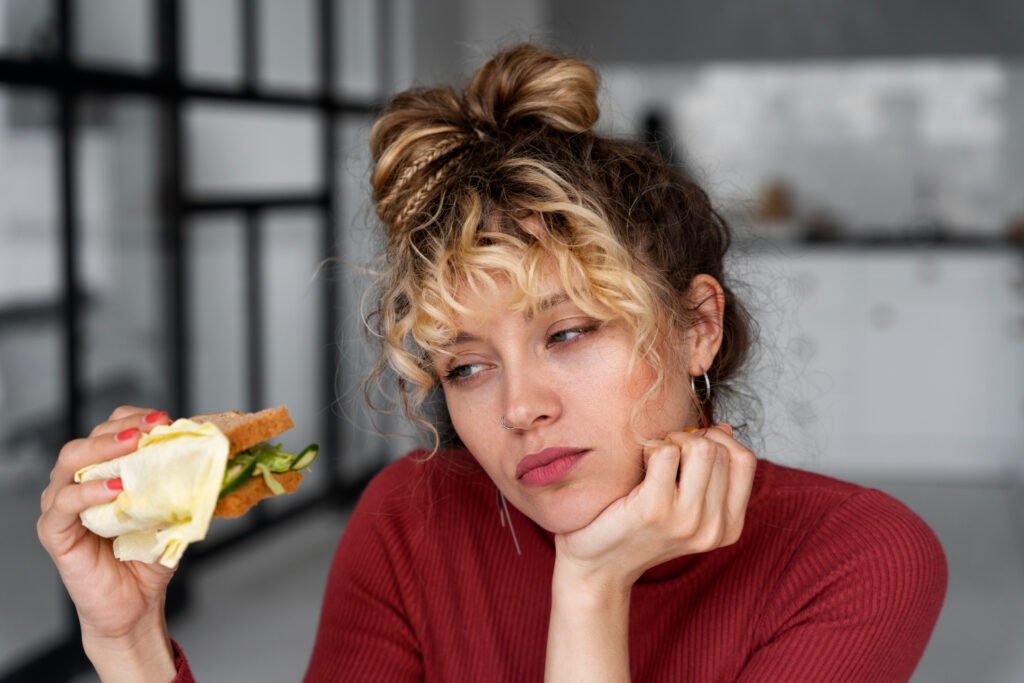
In this article
Managing anxiety and depression involves more than just therapy and medication; your diet plays a crucial role too. Here are some common foods and drinks to avoid if you’re dealing with these mental health conditions.
Fruit Juice
Whole fruits are rich in fiber, which helps regulate how your body absorbs energy. When you drink fruit juice, you miss out on that fiber, turning your beverage into a sugary drink that can cause rapid spikes and crashes in your blood sugar levels. This can leave you feeling irritable and anxious. Stick to whole fruits and drink water when you’re thirsty.
Regular Soda
Soda is a double whammy: it’s high in sugar and devoid of any nutritional benefits. Sugar-sweetened beverages like soda are directly linked to increased rates of depression. If you crave something fizzy, opt for seltzer water with a splash of juice instead. It satisfies your craving without the excessive sugar.
Diet Soda
While diet soda lacks sugar, it’s not a guilt-free option. Artificial sweeteners in diet soda can contribute to depression and might even worsen your mood compared to sugary sodas. Additionally, the caffeine in many diet sodas can increase anxiety. If you need a soda fix, consider limiting your intake or finding alternatives like herbal teas.
White Bread Toast
Yes, even your morning toast can be problematic if it’s made from white bread. The refined flour in white bread rapidly converts to sugar in your bloodstream, causing energy spikes and crashes. These fluctuations can exacerbate anxiety and depression. Opt for whole-grain bread to enjoy your toast without the negative side effects.
‘Light’ Dressing
Many store-bought light dressings contain artificial sweeteners such as aspartame, which has been associated with anxiety and depression. High-fructose corn syrup in regular dressings is also problematic. Making your own dressing at home ensures you avoid these harmful additives and control what goes into your meal.
Ketchup
Ketchup may seem harmless, but it’s packed with sugar – about four grams per tablespoon. Light versions often contain artificial sweeteners linked to anxiety and depression. A healthier alternative is homemade tomato salsa, which can provide the tangy flavor you crave without the added sugars. Adding a bit of cayenne pepper can give it a spicy kick.
Coffee
Caffeine can make you jittery and anxious if you’re not used to it, and it can disrupt your sleep patterns, worsening anxiety and depression. Withdrawal from caffeine can also lead to negative feelings. If coffee makes you anxious, consider cutting it out gradually. For those who tolerate it well, moderate coffee consumption can sometimes help alleviate depression.
Energy Drinks
Energy drinks are infamous for their elevated caffeine levels, frequently concealed by ingredients such as guarana.These drinks can cause irregular heartbeats, anxiety, and sleep disturbances. They also tend to be loaded with sugar or artificial sweeteners. Instead of reaching for an energy drink, try drinking water and eating a piece of fruit for a natural energy boost.
Alcohol
Alcohol can disrupt your sleep, which is vital for managing anxiety and depression. While a small amount might help you feel relaxed, too much can lead to worse symptoms. The key is moderation: limit your intake to one drink per day for women and two for men to avoid exacerbating mental health issues.
Frosting
Frosting is not just high in sugar but also contains trans fats, which are linked to depression. These fats are also found in fried foods, pizza dough, and many baked goods. Checking labels for “partially hydrogenated oils” can help you avoid these unhealthy fats. Instead, focus on consuming healthy fats from fish, olive oil, nuts, and avocados, which can improve your mood.
Soy Sauce
For those sensitive to gluten, soy sauce can be a hidden source of anxiety and depression. Gluten is found in many prepackaged foods, including soy sauce. If gluten sensitivity affects your mental health, read labels carefully and opt for gluten-free alternatives.
By being mindful of these foods and drinks, you can better manage anxiety and depression. Making small changes in your diet can have a significant impact on your overall mental well-being
A Quick Review
Managing anxiety and depression involves more than therapy and medication; your diet also plays a critical role. Avoid foods and drinks high in sugar, artificial sweeteners, and caffeine, as they can exacerbate symptoms. Opt for whole grains, homemade dressings, and natural alternatives to maintain stable energy levels and improve mental well-being
FAQS
How does sugar impact anxiety and depression?
Sugar can cause rapid spikes and crashes in blood sugar levels, leading to mood swings, irritability, and worsening anxiety and depression symptoms.
Are artificial sweeteners harmful to mental health?
Yes, artificial sweeteners like aspartame have been linked to increased anxiety and depression in some individuals.
Is alcohol consumption bad for depression?
While moderate alcohol consumption can be socially beneficial, excessive drinking can disrupt sleep and worsen depression.
Can gluten affect anxiety and depression?
For those sensitive to gluten, it can cause anxiety, depression, and sluggishness. Avoiding gluten may help improve these symptoms.












